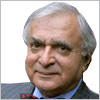Vous pouvez contribuer simplement à Wikibéral. Pour cela, demandez un compte à adminwiki@liberaux.org. N'hésitez pas !
Deepak Lal
| Deepak Lal | |||||
| Économiste | |||||
|---|---|---|---|---|---|
| Dates | Né en 1940 | ||||

| |||||
| Tendance | |||||
| Nationalité | |||||
| Articles internes | Autres articles sur Deepak Lal | ||||
| Citation | |||||
| Interwikis sur Deepak Lal | |||||
Deepak Lal est né en 1940 à Lahore (Inde), et mort le 30 avril 2020 à Londres. Il était professeur de développement international à l'université de Californie à Los Angeles, professeur de politique économique à l'university College de Londres, et co-directeur du département commerce et développement à l'Institut des affaires économiques à Londres.
Il commença par travailler au ministères des Affaires étrangères (1963-1966), puis il fut maître de conférence au Jesus College à Oxford et à Christ Church à Oxford (1966-1968). Il devint ensuite chercheur au Nuffield College, à Oxford (1968-1970), pour enseigner par la suite la politique économique à l'university College de Londres (1970-1984). Il fut professeur à l'université de Londres de 1984 à 1993.
Deepal Lal est l'auteur de nombreux livres et articles sur le développement économique et la politique publique, en défendant les idées libérales.
Il a été président de la société du Mont-Pèlerin de 2008 à 2010.
Publications
- 1980, Prices for Planning, Heinemann Educational Books, London
- 1983, The Poverty of 'Development Economics', Institute of Economic Affairs, London
- Nouvelle édition en 1985, Cambridge, MA: Harvard University Press
- Nouvelle édition en 1997, Institute of Economic Affairs, London [lire en ligne]
- 1986, avec P. Collier, Labour and Poverty in Kenya
- 1987, Markets, Mandarins, and Mathematicians, Cato Journal, Vol 7, Spring/Summer, pp43—70
- Repris en 1994, In: Deepak Lal, Against Dirigisme, ICEG, ICS Press, San Francisco
- 1988, The Hindu Equilibrium, Clarendon Press, Oxford, vol 1
- 1989, The Hindu Equilibrium, Clarendon Press, Oxford, vol 2
- 1993, The Repressed Economy, Edward Elgar, Aldershot, ISBN-13: 9781852788889 ISBN 1852788887
- 1994, Against Dirigisme, ICEG, ICS Press, San Francisco
- 1995, Eco-Fundamentalism, International Affairs, Vol 71, pp515-528
- 1996, avec H. Myint, "The Political Economy of Poverty, Equity and Growth", Oxford: Clarendon
- 1997, "From Planning to Regulation: Toward a New Dirigisme?", The Cato Journal, Vol 17, n°2, pp211–227
- 1998,
- a. Unintended Consequences: The Impact of Factor Endowments, Cambridge, Mass.: MIT Press
- b. The Minimum Wage: No Way to Help the Poor, seconde édition, IEA, Occasional Paper 95
- 1999, "Unfinished Business", New Delhi: Oxford University Press
- 2000,
- a. "Does Modernization Require Westernization?", The Independent Review, Vol 5, n°1, Summer, pp5-24
- b. commentaire du livre de James C. Scott, "Seeing Like a State: How Certain Schemes to Improve the Human Condition Have Failed", The Independent Review, Vol 5, n°1, Summer
- 2002, "Globalization and culture", In: Richard M. Ebeling, dir., "Globalization: Will Freedom or World Government Dominate the International Marketplace?", Champions of freedom, Vol 29, Hillsdale, Mich.: Hillsdale College Press, pp69-88
- 2003,
- a. Free Trade and Laissez Faire: Has the Wheel Come Full Circle?”, The World Economy, Vol 26, No 4, avril
- b. avec Hyongwon Kim, Gonglu Lu et Jordi Prat, The Welfare Effects of Tobacco Taxation: Estimates for 5 Countries/Regions, Journal des économistes et des études humaines, Vol 13, n°1, mars
- 2004, "India", In: Peter Bernholz et Roland Vaubel, dir., "Political Competition, Innovation and Growth in the History of Asian Civilizations", Edward Elgar, pp128-141
- 2006,
- a. The Status Quo in Kashmir?, In: R.N. Rosecrane & A. A. Stein (eds): No More States? Rowman & Littlefield, Lanham, MD
- b. Will Terrorism Defeat Globalization?, In: R.N. Rosecrane & A. A. Stein (eds): No More States? Rowman & Littlefield, Lanham, MD
- c. The Contemporary Relevance of Heckscher’s Mercantilism, In: R. Findlay, R. G. Henriksson, H. Lindgren et M. Lundahl, Dir., Eli Heckscher, International Trade, and Economic History, MIT Press, Cambridge, 2006 books, pg 305-319
- d. "India: Population Change and Its Consequences", Population and Development Review, supp, Vol 32
- e. "Reviving the Invisible Hand: The Case for Classical Liberalism in the Twenty-first Century", Princeton University press
- Nouvelle édition paperback en 2008
- 2008,
- a. "An Indian economic miracle?", Cato Journal, 28(1), pp11-34
- b. "India, Economics", In: Steven N. Durlauf et Lawrence E. Blume, dir., "The New Palgrave Dictionary of Economics", 2nd ed, London: Macmillan Palgrave
- c. "Foreword", dir., "Making Poor Nations Rich: Entrepreneurship and the Process of Economic Development", Independent Institute/Stanford University Press, ppxi-xviii
| Accédez d'un seul coup d’œil au portail économie. |